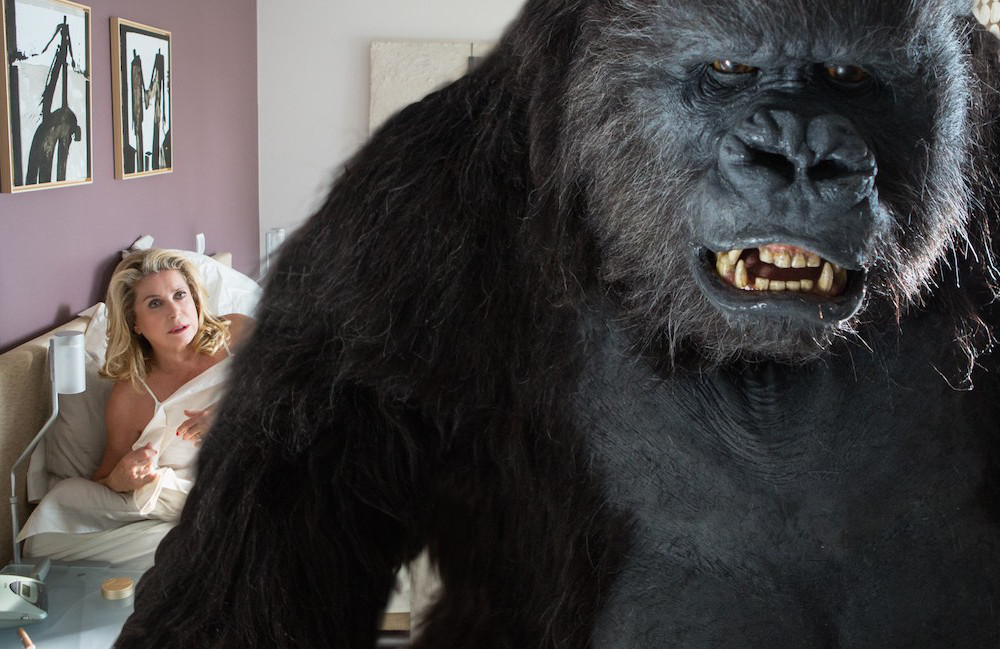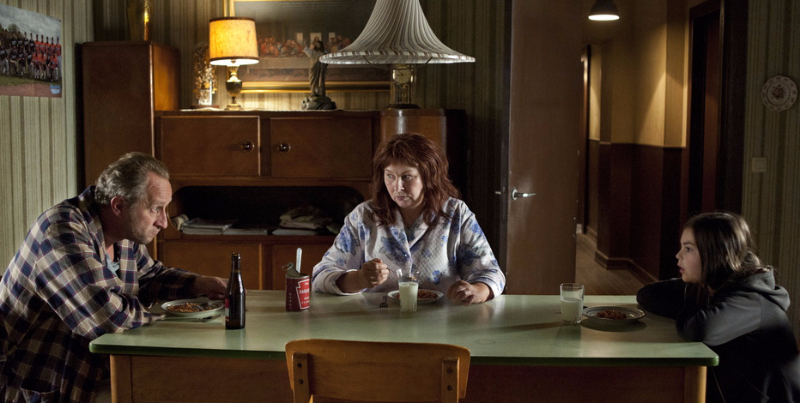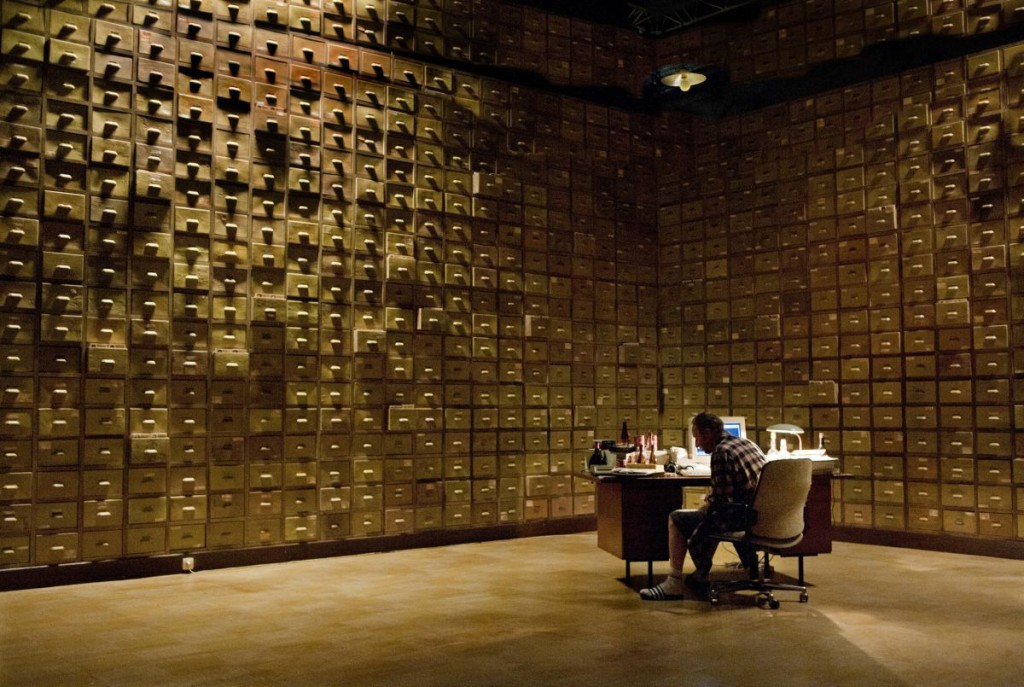The idiosyncratic director discusses how religion and feminism have impacted his work.

Jaco van Dormael’s The Brand New Testament envisions a world where God not only exists - he lives in Brussels. What’s more, the Holy Trinity is no longer a highly patriarchal trio, but a family made up of God, his wife and his son and daughter. Rather than focus on the more familiar elements of that family, Dormael hones in on daughter Ea.
Not only is this a rather wonderful Feminist revision of the Christian faith, The Brand New Testament also definitely reminds you what an unusual part of the film world Belgium is. Whilst it may not be producing films that you’ll necessarily be seeing at your local Odeon any time soon, the country is producing some really exciting stuff at the moment, and Dormael’s latest makes a fascinatingly idiosyncratic addition to that.
What with Belgium being a real melting pot for many different cultures, you can definitely see elements of French magic realism in Dormael’s latest, but this feature is equally a movie which has very contemporary roots in the recent resurgence of Surrealism. It’s a kind of dreamy logic you can also certainly hear in the way the director sometimes expresses himself.
But not everything is necessarily light and dreamy in this comedy film. There are already hints of the darker sides to religion which were to recently scar Brussels, and Jaco traces back these sinister forebodings of what can be done in the name of God in this interview.

How do you think you would describe yourself as a filmmaker or your approach to making films?
Well, I’m not like the brothers Lumière, who have this kind of “this is reality, believe me” view attached to their films. But then nor am I like Méliès when he says, “don’t believe me, this is my imagination, and we are on the moon.” I’m just in between, focusing on the perception of the reality you could have, even without ever really knowing what is reality.
So you’re very interested in perception?
Absolutely. Ever since I made Toto the Hero, my films have had surreal things like dancing flowers, and I guess that’s the sort of thing I’m still interested in. Specifically this sort of point where what you’re seeing is not reality, but it’s also not quite imagination. What interests me rather is trying to work out how to film the way we perceive.
Even with this film we were trying to sort of mirror a religious kind of perception of the universe, for example. So all of our shots are frontal, symmetrical and centralised, like the kind of views and perspectives you would find in a church. That meant that even when we’re filming things like the inside of a washing machine, we were still trying to give it the symmetry of a cathedral.
What interests me rather is trying to work out how to film the way we perceive.”
Were you also very interested in children’s perception in this film, and in trying to speak to audiences’ inner child?
Yes, probably all the characters in this film are children. Like, even the adults really are just children. With all of the grownups, it was always very important to me to show a scene where they were also shown as they were as kids, full of this sort of protean quality.
As with all kids, these characters then grow up by putting themselves in little boxes, by saying, “okay, my life is just this little box, I don’t have to dream of anything beyond that.” Then what always happens is this little box opens in the film, and there will be all these lots of different possibilities in life. Things they would not have found in their everyday catalogues. Those possibilities being things like the possibility of falling in love, or things that are just crazy, bizarre or unexpected. But those kinds of things do exist.
I think what I like about depicting kids is the fact that they are rebels too. Perhaps the defining character of kids is that they are rebels, even when they don’t know it. It’s just because they haven’t yet learnt how to correspond to, or resemble, what they think other people expect them to be. Instead they just see things for the first time, and I guess they react to things in a surreal way sometimes.

You could say there are also darker elements in your film, like the oppressive god-like father figure you create. Where do you think that came from when you were writing the script?
I think when we started to write, it was at the same time that in France there was a march against marriage equality, with people coming out with crosses and marching in the street. I think it was then that I remember having this feeling of, oh my God, that is a dark god. Then when we were editing the film, there were the attacks on Charlie Hebdo, and I thought, oh my God, that’s a dark god too.
These are two gods whose path I would prefer never to cross. These are frightening gods, like the God you find in the Old Testament. Like when it’s written in these very first biblical texts that “God is jealous” and he destroys cities or asks a father to kill his son to prove his love. It’s crazy stuff. But yeah, then Jesus came and he was a rebel.
Are you a religious person?
No, I don’t believe in God. So for me, this film was meant to be written as if it was like a tale. And, like you said, it was meant to be like a tale for children in a way, because it has the structure of something like Alice in Wonderland or Don Quixote or things like that. But then it also has the structure of something like Amelie, because that film too has a very Christic structure.
If you think about it, in the Bible Jesus meets people, and then he tries to create little miracles with them. It’s the same in Amelie or with The Seven Samurai or The Dirty Dozen, they’re also Christic. It’s that kind of thing with my story, it has this same kind of Christic structure. The little girl meets all these people one by one, making miracles.
I don’t believe in God. So for me, this film was meant to be written as if it was like a tale.”
And how were you approaching writing each encounter, were you treating them like separate mini short stories?
Usually I love films that ask you questions but don’t give you answers; but at the same time I think the answer can always be found in the structure. So the way you chose to tell the story gives people this certain kind of perception or feeling. Most films that are made these days, for example, are made in three acts, with a beginning, middle and end, meaning that you always know to wait for an answer that will come at the end, an answer which will answer everything that has preceded it.
This is something I like to work against in my films, like when I made Mr. Nobody. In that film it’s totally the opposite. In fact, instead of focusing the narrative at the end, that film actually spreads like a tree. Then with The Brand New Testament, I’ve created a film that is episodic. So as in Don Quixote, you end up forgetting where you are going whilst you’re on the path. Instead, you just focus on the cobbles around you and you smell the grass. It’s just a moment that happens, and then after that there is another moment and another and another. That’s what I was trying to create.
In many ways, I think it’s actually much harder to do this, because then every moment you create has to be precious. It has to have the smell or the taste of something very special. That takes a lot of care to achieve, because everything then has to be beautiful.

Were you also very consciously trying to create a sort of Feminist correction to the narrative of Christianity when you wrote this film?
I definitely did. But I think what’s actually so striking is the fact that this really is incredibly absent in all of the books. All of the religious texts are written by men for men – and they’re written with fear.
Now, in my life at least, it isn’t like that. Women sometimes speak more than men, you know? So I wanted to make a film that reflected that. I wanted to make a film where women speak more than men. Or at least a film where there are just as many women as there are men present, just as in my life.
It looks and sounds revolutionary, but it’s not, because it’s just the life we lead. What really is far more strange is the fact that this is so absent, in most of the religions.
It looks and sounds revolutionary, but it’s not, because it’s just the life we lead.”
And is your film suggesting the world might be a better place if it wasn’t like that, and if women were in charge more?
Yeah, there really aren’t many religions with goddesses, so one of the questions in the film is definitely, would the world be more sweet if there was? When a child hurts themselves, they often cry, “mummy, mummy,” before they call for their dad, so maybe if there were more goddesses, it would be more consoling?
But you’ve set your film in Brussels, presumably quite a metropolitan city, and you’ve gone to the effort to add a female element to the Christian narrative – could you not have also added an element that was not made up by an all-white cast?
Indeed, you’re right. I should have. Yeah, I think I realised that once it was written, and it is still pretty white. It certainly could have been more mixed, for sure.
There was one kind of diversity I was very consciously aiming at, though, but only in Belgium would you be able to notice it. It would be like in British films when you recognise an accent from Scotland or London or Wales. In my film, Jesus has the accent of Liège, God has the accent of Namur, and it’s the same sort of north and south thing you would have here in Britain. Some are even accents from regions of Belgium that are trying to become independent, and I think it adds a layer of fun to a film set in Brussels, a city where everyone is welcome.
Brand New Testament is out now in select cinemas.


